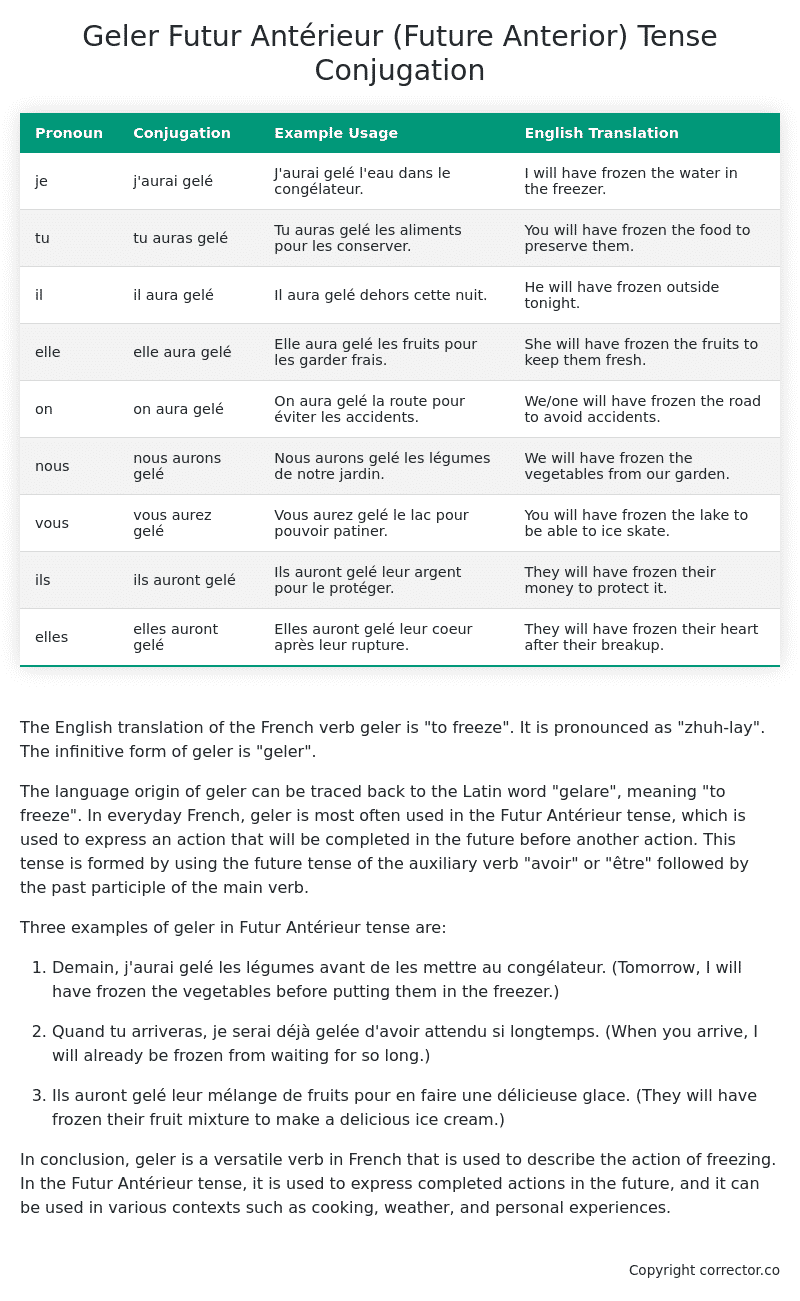Futur Antérieur (Future Anterior) Tense Conjugation of the French Verb geler
Introduction to the verb geler
The English translation of the French verb geler is “to freeze”. It is pronounced as “zhuh-lay”. The infinitive form of geler is “geler”.
The language origin of geler can be traced back to the Latin word “gelare”, meaning “to freeze”. In everyday French, geler is most often used in the Futur Antérieur tense, which is used to express an action that will be completed in the future before another action. This tense is formed by using the future tense of the auxiliary verb “avoir” or “être” followed by the past participle of the main verb.
Three examples of geler in Futur Antérieur tense are:
-
Demain, j’aurai gelé les légumes avant de les mettre au congélateur. (Tomorrow, I will have frozen the vegetables before putting them in the freezer.)
-
Quand tu arriveras, je serai déjà gelée d’avoir attendu si longtemps. (When you arrive, I will already be frozen from waiting for so long.)
-
Ils auront gelé leur mélange de fruits pour en faire une délicieuse glace. (They will have frozen their fruit mixture to make a delicious ice cream.)
In conclusion, geler is a versatile verb in French that is used to describe the action of freezing. In the Futur Antérieur tense, it is used to express completed actions in the future, and it can be used in various contexts such as cooking, weather, and personal experiences.
Table of the Futur Antérieur (Future Anterior) Tense Conjugation of geler
| Pronoun | Conjugation | Example Usage | English Translation |
|---|---|---|---|
| je | j’aurai gelé | J’aurai gelé l’eau dans le congélateur. | I will have frozen the water in the freezer. |
| tu | tu auras gelé | Tu auras gelé les aliments pour les conserver. | You will have frozen the food to preserve them. |
| il | il aura gelé | Il aura gelé dehors cette nuit. | He will have frozen outside tonight. |
| elle | elle aura gelé | Elle aura gelé les fruits pour les garder frais. | She will have frozen the fruits to keep them fresh. |
| on | on aura gelé | On aura gelé la route pour éviter les accidents. | We/one will have frozen the road to avoid accidents. |
| nous | nous aurons gelé | Nous aurons gelé les légumes de notre jardin. | We will have frozen the vegetables from our garden. |
| vous | vous aurez gelé | Vous aurez gelé le lac pour pouvoir patiner. | You will have frozen the lake to be able to ice skate. |
| ils | ils auront gelé | Ils auront gelé leur argent pour le protéger. | They will have frozen their money to protect it. |
| elles | elles auront gelé | Elles auront gelé leur coeur après leur rupture. | They will have frozen their heart after their breakup. |
Other Conjugations for Geler.
Le Present (Present Tense) Conjugation of the French Verb geler
Imparfait (Imperfect) Tense Conjugation of the French Verb geler
Passé Simple (Simple Past) Tense Conjugation of the French Verb geler
Passé Composé (Present Perfect) Tense Conjugation of the French Verb geler
Futur Simple (Simple Future) Tense Conjugation of the French Verb geler
Futur Proche (Near Future) Tense Conjugation of the French Verb geler
Plus-que-parfait (Pluperfect) Tense Conjugation of the French Verb geler
Passé Antérieur (Past Anterior) Tense Conjugation of the French Verb geler
Futur Antérieur (Future Anterior) Tense Conjugation of the French Verb geler (this article)
Subjonctif Présent (Subjunctive Present) Tense Conjugation of the French Verb geler
Subjonctif Passé (Subjunctive Past) Tense Conjugation of the French Verb geler
Subjonctif Imparfait (Subjunctive Imperfect) Tense Conjugation of the French Verb geler
Subjonctif Plus-que-parfait (Subjunctive Pluperfect) Tense Conjugation of the French Verb geler
Conditionnel Présent (Conditional Present) Tense Conjugation of the French Verb geler
Conditionnel Passé (Conditional Past) Tense Conjugation of the French Verb geler
L’impératif Présent (Imperative Present) Tense Conjugation of the French Verb geler
L’infinitif Présent (Infinitive Present) Tense Conjugation of the French Verb geler
Struggling with French verbs or the language in general? Why not use our free French Grammar Checker – no registration required!
Get a FREE Download Study Sheet of this Conjugation 🔥
Simply right click the image below, click “save image” and get your free reference for the geler Futur Antérieur tense conjugation!

Geler – About the French Futur Antérieur (Future Anterior) Tense
Construction
Common Everyday Usage Patterns
Interactions with Other Tenses
For example
Summary
I hope you enjoyed this article on the verb geler. Still in a learning mood? Check out another TOTALLY random French verb conjugation!


